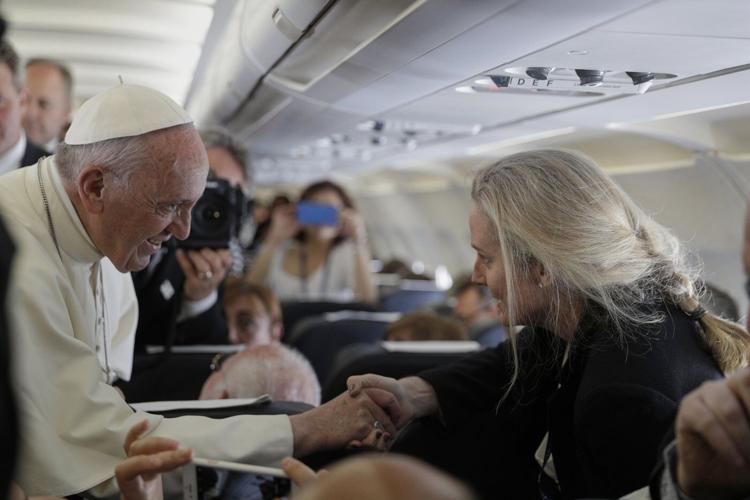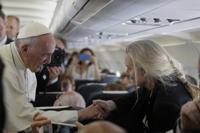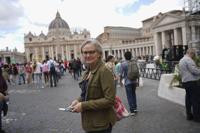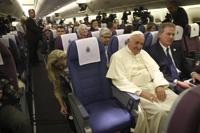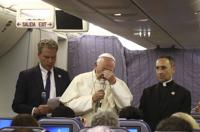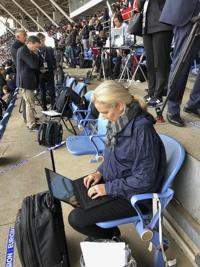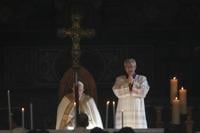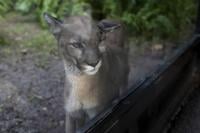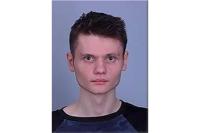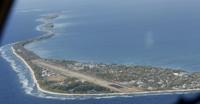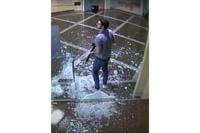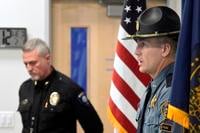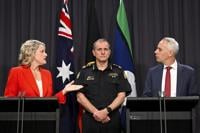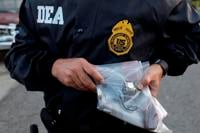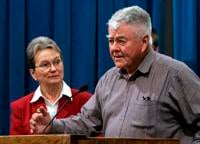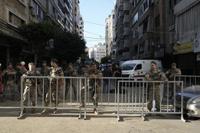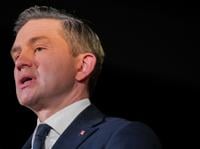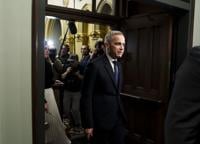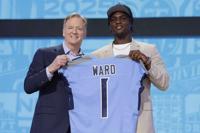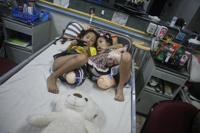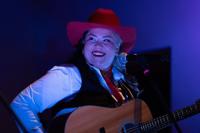VATICAN CITY (AP) — He called me “la prima della classe,” or “the first in class.” It wasn’t necessarily a compliment.
I had earned the nickname from in 2018, a year that marked a low point , and a turning point in how he handled cases of priests who sexually abused children.
The pope had just bungled a big abuse case in Chile and I, like many in the Vatican press corps, reported the scandal during Francis’ problematic trip to the South American country. , defended a bishop implicated in covering up their case and showed himself to be insensitive to their trauma.
A turbulent news conference
Returning to Rome, Francis was inundated with questions during the traditional in-flight news conference. Turbulence temporarily halted the session, but when it resumed, I picked up where others had left off, pressing the issue and incredulous that he seemed so unaware of the victims' pain.
Francis insisted no victims had come forward to accuse of protecting the abuser priest, Fernando Karadima. I knew otherwise, and told Francis as much in a tone of voice that still shocks me today.
“It's the victims who are saying this,” I told him.
“I haven’t heard from any victim of Barros,” Francis responded.
“There are! There are!” I insisted. The pope interrupted, but I cut him off, my voice rising. “No! There are victims of Karadima who say that Barros was there!”
“But they didn’t come forward," Francis replied. "They didn’t give evidence for a judgment. You, with good intentions, tell me that there are victims, but I haven’t seen them because they didn’t present themselves.”
By the genteel standards of Vatican protocol, it was a stunningly sharp exchange. Francis could have dug in or retaliated against me and other journalists who challenged him so publicly.
But he didn’t. His response — commissioning an investigation and, once finished, apologizing to the victims for discrediting them — underscored what friends and foes alike saw as one of Francis' most remarkable attributes: a willingness to admit mistakes and change course.
In a 2023 interview with The Associated Press, Francis acknowledged the 2018 airborne news conference was a turning point — the moment he understood the depths of the abuse scandal.
“I couldn’t believe it. You were the one on the plane who told me, ‘No, that’s not the way it is, Father,’” .
“That’s when the bomb went off, when I saw the corruption of many bishops in this,” he said, making a gesture indicating his head had exploded.
A nickname emerges
By then, Francis already had bestowed the nickname on me, coming up with it in August 2018, while the Chilean scandal was still fresh.
AP colleague Eva Vergara and I had followed up with a story that Francis had indeed from a Chilean victim detailing the abuse and cover-up he endured.
Again aboard Air Pope One heading to Ireland, Francis came back to greet journalists. When he got to my row, Francis smiled, shook my hand and said, “Ahh, la prima della classe. La prima della classe.”
I wondered what he meant. In Italian it can be translated as “the first in class.” But it can also carry a negative connotation: a know-it-all, goody-goody or teacher’s pet.
I saw the nickname as Francis' grudging acknowledgement that AP and I had accurately called him out and corrected him.
As reporters, we had to keep a professional distance, covering him in the tough but fair way that met our standards and which was perhaps behind his respect for our work.
An evolving relationship with the press
The nickname stuck, and Francis used it whenever we met. In many ways, it showed how his relationship with the press evolved over time.
When he was elected, Francis made clear his discomfort with journalists. He had had negative experiences in Argentina, where his record as head of the Jesuits in the 1970s during the military dictatorship and his tenure as Buenos Aires archbishop had put him in the media crosshairs.
“Truly, I don’t give interviews. Why, I don’t know, it’s just that way,” Francis told reporters traveling to Brazil in 2013 for his first foreign trip as pope.
Over time, Francis loosened up and his airborne news conferences became a new chapter in papal communication. His comments sometimes required official clarifications, but they pushed the envelope in ways he couldn’t in speeches or documents on issues like LGBTQ+ outreach or the role of women in the church.
Francis granted more interviews than his two predecessors combined, using the media to speak to his flock in the informal, personal style that characterized his papacy.
A work-life dilemma arises
Our last substantive encounter came in January 2024, when reporters met with him in the Apostolic Palace. At the time, I was concerned with an impending work-life conflict: My daughter would be starting college in late August and our family was planning to be in New England to attend orientation and move her into her dorm.
At the same time, rumors were circulating that Francis would embark on his longest, most ambitious trip: a four-nation tour of Asia that, in all likelihood, would occur in late August.
I couldn’t miss either.
At the end of the audience, Francis greeted the journalists individually. To this day, I cannot believe what I said, but I laid out my dilemma, summoning both maternal desperation and nothing-to-lose chutzpah. Ever polite, Francis listened intently — he often asked about my children — as I suggested, somewhat cheekily, that delaying the Asia trip would enable me to cover it.
Francis didn’t dismiss it outright, and I figured I could at least tell my daughter I had tried, knowing I'd inevitably have to tell her the Asia trip would take precedence.
A final surprise
Months later, to my astonishment, the date of the trip was announced: Sept. 2-13. I could do both.
I didn’t dare think my impromptu conversation as Francis met scores of journalists could have entered into the complicated calculations of organizing a papal trip.
But I later received a breathless voicemail from someone close to Francis who had just met with him. “You will not believe what he told me,“ he said. The pope said he changed the dates of the trip to ensure I could come, he said.
I still don’t know if other factors affected what became the last major foreign journey of Francis' life.
I'm grateful I was able to go. I was a witness as Francis, hobbled and in a wheelchair, ministered to his flock in Indonesia and Singapore, the jungles of Papua New Guinea and , where half the population attended his final Mass in Dili.
On the long plane ride home, I wrote about his resilience.
“There was Francis, defying the doubters who had questioned if he could, would or should make such an arduous trip to Asia given everything that could go wrong,” my story said. “The moment seemed to serve as proof that, despite his age, ailments and seven hours of jet lag, Pope Francis still could pope, still likes to pope and has it in him to pope like he used to at the start of his pontificate.”
I'd like to think he might have read it, knowing it came from “la prima della classe.”
___
Associated Press religion coverage receives support through the AP’s with The Conversation US, with funding from Lilly Endowment Inc. The AP is solely responsible for this content.

